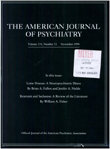Bizarre delusions and DSM-III-R schizophrenia
Abstract
OBJECTIVE: Bizarre delusions are assigned greater weight relative to other delusions in the DSM-III-R diagnosis of schizophrenia. The decision to emphasize bizarre delusions was based largely on historical tradition rather than empirical evidence. This study examined 1) the extent to which a history of bizarre delusions contributes to the diagnosis of schizophrenia and 2) whether schizophrenic patients with bizarre delusions constitute a clinically distinguishable subgroup. METHOD: Two hundred fourteen consecutively admitted psychotic inpatients were assessed for bizarre delusions according to the DSM-III- R criteria. Clinical and demographic correlates of bizarre delusions were examined in subsets of patients diagnosed as schizophrenic according to DSM-III-R who also received CT scans and neuropsychological testing. RESULTS: With the base prevalence rate for schizophrenia of 0.71, bizarre delusions had a sensitivity of 0.79, a specificity of 0.56, and a positive predictive power of 0.82 for the diagnosis of schizophrenia (N = 152) relative to other psychotic disorders (N = 62). Clinical, neurobehavioral, CT scan, and premorbid adjustment data on the schizophrenic patients indicated that beyond manifesting more severe positive symptoms, patients with bizarre delusions did not otherwise constitute a clinically distinguishable subgroup. CONCLUSIONS: The data suggest that criterion A for the diagnosis of schizophrenia in DSM-IV could be improved by removing the special emphasis that was placed on bizarre delusions in DSM-III-R.
Access content
To read the fulltext, please use one of the options below to sign in or purchase access.- Personal login
- Institutional Login
- Sign in via OpenAthens
- Register for access
-
Please login/register if you wish to pair your device and check access availability.
Not a subscriber?
PsychiatryOnline subscription options offer access to the DSM-5 library, books, journals, CME, and patient resources. This all-in-one virtual library provides psychiatrists and mental health professionals with key resources for diagnosis, treatment, research, and professional development.
Need more help? PsychiatryOnline Customer Service may be reached by emailing [email protected] or by calling 800-368-5777 (in the U.S.) or 703-907-7322 (outside the U.S.).



